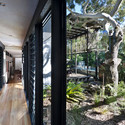
- Area: 727 m²
- Year: 2009
-
Photographs:Christopher Frederick Jones
Text description provided by the architects. The Marcus Beach house celebrates a natural, coastal setting providing its occupants with an inextricable relationship to the landscape and sensitive surrounding environment. The dwelling explores lightness, filtering natural breezes, layers of transparency and integrating indoor / outdoor spaces within dynamic patterns of light and shadow, being a simple frame to enable a contemporary sustainable lifestyle to unfold.

Whilst feeling like a ‘beach house’ sited 250 meters away from Marcus Beach, the basic ‘pavilion’ plan was sketched out in the sand during an early site visit: a simple diagram of two pavilions placed either side of a venerable 100 year old Moreton Bay Ash that takes centre stage to the scale, proportions and life of the house around it. The pavilions sit lightly on the site and are linked by a transparent bridge in an arrangement that opens all the spaces to the light, breeze and garden views of the north. The garden is protected by a perimeter wall wrapped in endemic vines providing an acoustic ‘green’ buffer to a nearby busy road.
On approach from the street, the sloping terrain naturally guides an axial timber boardwalk under a simple timber pergola structure arriving in the courtyard opposite the Moreton Bay Ash. The main pavilion to the west accommodates living spaces focused around a double height deck space overlooking the swimming pool and northern garden. The Master Bedroom suite is accessed via a polycarbonate clad stair tower that is by day a contemplative space and by night, a lantern. The Moreton Bay Ash casts shadows onto the polycarbonate further animating the edges of the courtyard and bringing the landscape inside the house. The recent additions of a study ‘pop out,’ enclosed passage link below the bridge, Laundry and Powder room further animate the edges of the courtyard space whilst responding to the needs of its new occupants.
The house is open and light and possesses simple sustainable design principles to passively defend the occupants from the elements. Windows and doors are strategically positioned to capture the prevailing breezes whilst roof overhangs are generous protecting the house from direct summer sunlight. Air conditioning has not been installed in the Marcus Beach House nor is it desired. Artificial lighting is kept to a minimum due to the generous amount and position of glazing, particularly facing north. The roof over the Master Bedroom pavilion rises to the north providing a band of high level, operable, clerestory glazing capturing daylight and allowing any warm air to escape, setting up an effective ‘stack effect’ natural cooling process.

The connection between the deck and living spaces is dynamic and direct. As the heart of the house, the covered double height outdoor room is actively used all year round as dappled sunlight is filtered through a timber batten screen hung below the roof structure. Indoor and outdoor realms are connected through an interlocking series of alcoves and nooks like a low edge deck seat and reading nook pop-out located off the stair landing. The courtyard and Moreton Bay Ash are a focal point in which almost all rooms within the dwelling enjoy a connection.
























